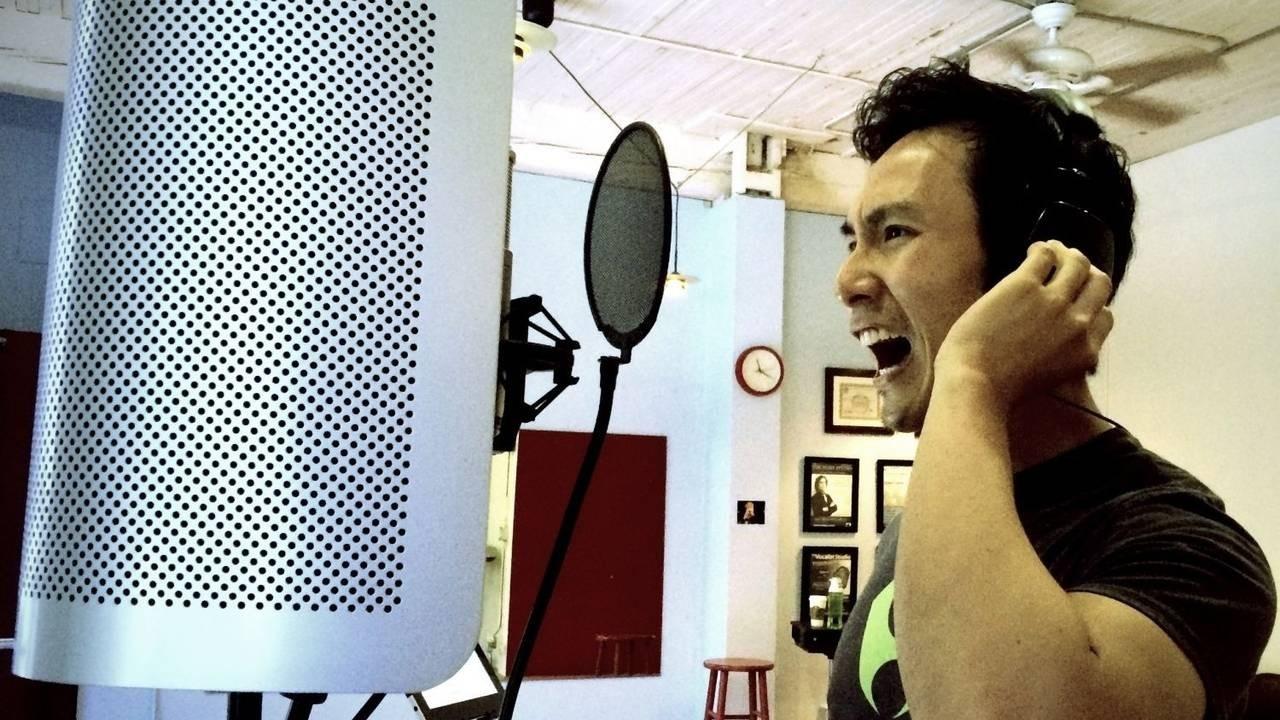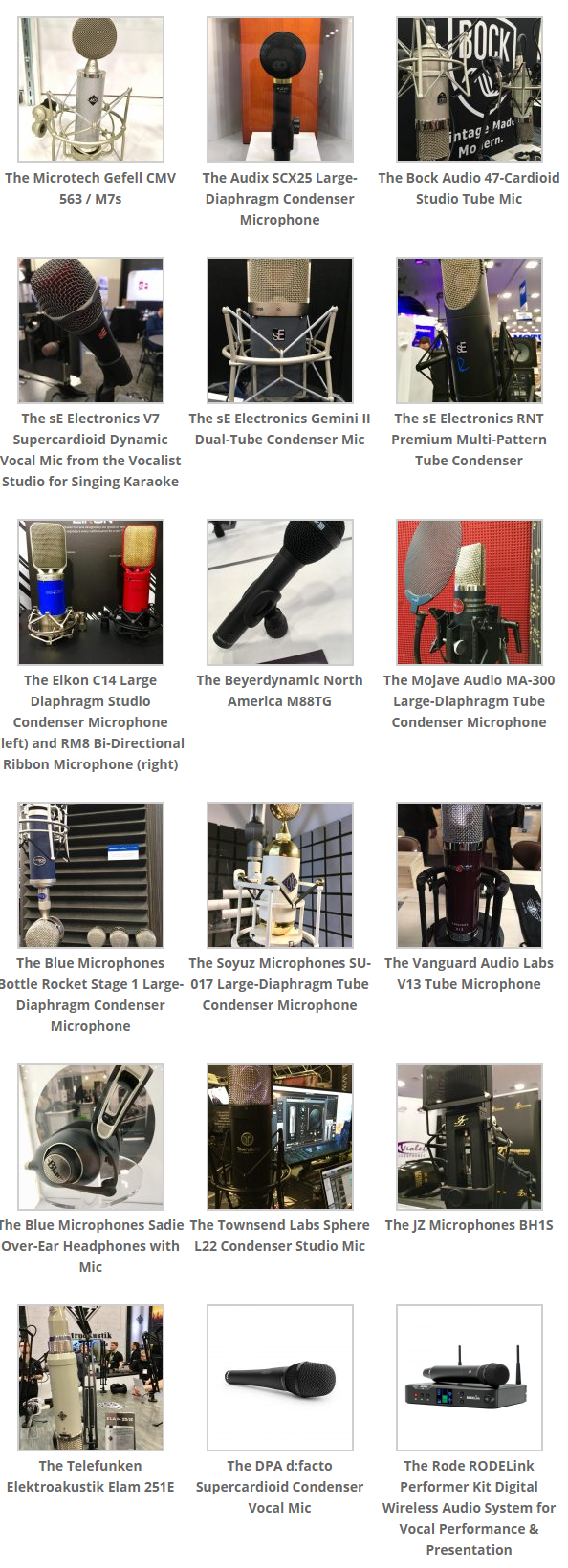Top Recommended Microphones
Feb 14, 2018
Are you in the market for a microphone?
Don’t say no. If you are a serious vocalist, then you are ALWAYS looking out for the latest and greatest microphones on the market. (And we already know that you’re a serious vocalist, because you’re here, reading the TVS blog, after all.)
Maybe you’re already a microphone aficionado, and reading this blog post will be like eating candy for you. Perhaps you aren’t yet an expert, and you’re wondering which are the best microphones for singers. Whatever brings you here, read on, because this post is for you.
If you are a dedicated vocalist studying the TVS method, then you’ll definitely want to start training with amplification. That much is a given. So let’s discuss some of the different types of microphones out there, talk about a few of Robert Lunte’s go-to recommendations, and then check out some of the newest, coolest mics from the recent 2018 NAMM show. Also learn more about some of the greatest microphones.
First off, basics.
Feel free to skip this first section if you’re already a complete authority on microphones.
For the relative newbies to the world of vocal amplification, there are TONS of different mics on the market, but we’re going to briefly discuss a few major classifications today:
- Dynamic Microphones
- Condenser Microphones
- Ribbon Microphones
- Modeling Microphones
- Wireless Microphones
Read on to find out the some of the main differences between these types of tech.
Dynamic Microphones
 Dynamic microphones are more commonly used in live settings, on stage. They are generally the most sturdy microphones out there and are usually on the less expensive side. If you have never before purchased a microphone, a decent dynamic mic is an excellent place to start, as they are the top recommended microphones for beginners.
Dynamic microphones are more commonly used in live settings, on stage. They are generally the most sturdy microphones out there and are usually on the less expensive side. If you have never before purchased a microphone, a decent dynamic mic is an excellent place to start, as they are the top recommended microphones for beginners.
Click HERE to get a special TVS deal on the JZ HH1.
Condenser Microphones
 The Audio Technica AT5047 Cardioid Condenser Microphone
The Audio Technica AT5047 Cardioid Condenser Microphone
Condenser microphones are more commonly used in studio settings. Typically a bit more delicate than dynamic microphones, condenser mics are more sensitive and responsive, and they offer a more true-to-life sound than dynamics. They can pick up on finer nuances in sound. If you are looking for a microphone to use in a home studio that has some degree of soundproofing, you might want to look at condenser microphones.
Ribbon Microphones
 The AEA KU4 Unidirectional Ribbon Mic
The AEA KU4 Unidirectional Ribbon Mic
Ribbon microphones are a unique style of mic, built around a thin piece of metal — the “ribbon.” They have a rich natural sound and can capture the glorious tone from old recordings made in the 40s. However, they are often very delicate and fragile and they can be quite expensive. There are ribbon mics out there designed for live use, but they can still be a little more easily damaged than your go-to dynamic mic… so be very careful if using a ribbon mic on your next rock gig, and maybe consider saving the ribbon for studio use only!
Modeling Microphones
 The Antelope Audio Edge Modeling Microphone
The Antelope Audio Edge Modeling Microphone
Modeling microphones are more of a specialty item right now, but they are promising technology, poised to change the way we record vocalists and change the way we even think about mics. These are microphones that are designed to “model” other microphones.
Picture a microphone that can recreate either the same iconic sound from the mic the Frank Sinatra used… OR the same sound from the mic that your favorite radio host uses today. These microphones are incredibly versatile. They pair with advanced modeling engines to create killer recordings, and they are nothing short of amazing to hear in action.
Wireless Microphones
 The Rode RODELink Performer Kit Digital Wireless Audio System for Vocal Performance & Presentation
The Rode RODELink Performer Kit Digital Wireless Audio System for Vocal Performance & Presentation
Wireless microphones are used in any setting where the vocalist needs to be moving around a great deal. Training with a wireless microphone can be incredibly useful for vocalists who need to prepare for work in musical theatre or in any active performance setting. (Think of Beyoncé. Does she just stand and sing in front of a stationary mic at every show? Absolutely not.) Vocalists need to be able to perform in various different settings, with various different microphones, so training on a wireless system can be extremely beneficial, even for a beginning vocalist.
Robert’s Top Recommended Microphones
To access the full list of mics that Robert recommends that vocalists use, in order to train with amplification, then you’ll need to pick up your copy of The Four Pillars of Singing. However, we can tell you some mics from Robert Lunte’s list we would recommend. Also, JZ Microphones has offered TVS Students a special savings on any of their handheld live microphones or their recording microphones. Check it out here:
Click HERE for TVS Recommended Microphones & Home Recording Gear!
1) The JZ HH1 and The Sennheiser e935 Dynamic Microphone
These are robust, reliable handheld microphones that are reliable and sound great. The e935 has a fantastically balanced EQ, both low and high end. It is also super durable. Definitely should be one of your frontline microphones. The JZ HH1 is unique because it has a great balance of low and high end, but unlike other handhelds, it has an “airyness” or “windyness” to the coloration which I actually really like! This unique element to the microphones coloration gives the mic a hair of white noise. I think this mic is very well suited for rock and metal for this reason.
2) The Antelope Audio Edge Duo & Edge Solo
The Antelope Audio emulation microphones are really cutting-edge. Emulation technology allows singers to use plug-ins to capture the unique sound coloration characteristics of 18 of the world’s most legendary, classic recording microphones. In other words, you can purchase one microphone system, and get the sound color and characteristics of 18 microphones but just dropping and menu and selecting the emulation you want. Make sure to check out the Antelope Audio emulation microphones at The Vocalist Studio Vocal Gear Store! You can also purchase directly from Antelope Audio HERE and use this code to save $50: thevocaliststudio%
VIEW THE VIDEOS BELOW.
3) The Rode RODELink Performer Kit Digital Wireless Audio System
The Rode RODELink Performer Kit is a fabulous solution for the vocalist on the lookout for a wireless microphone that is inexpensive. Easy to set up, with a good sound, this system is something to consider if you’ve ever wanted to train and perform with a wireless microphone.
4) Vintage Microphones from the 60s, 70s & 80s
One of the most interesting and fun ways to purchase a microphone is to shop for refurbished microphones from previous eras. Many of these microphones sound great, just as good, or almost as good as contemporary microphones. They are all very rare. Great for microphone geeks and collectors. The industrial design and novelty of vintage handheld microphones is a big reason why these microphones are sought after. Here is a site where Robert Lunte shops for vintage microphones. Reverb.
Mics from the NAMM Show
All right, if you are an all-out microphone junkie, thanks for sticking around for the fun part of the post. We posted a few of these throughout the post…but check out these awesome photos from Robert’s amazing time at this year’s National Association of Music Merchants show. These mics are on the bleeding edge of musical technology. They are for vocalists who want to try something new and stand out. So check ‘em out!

And there you have it, folks! An overview of the different types of microphones out their for vocalists, a few of Robert’s top recommended microphones for singers looking to train with amplification, and some seriously cool photos from NAMM.
Don’t leave without grabbing The Four Pillars of Singing if you haven’t already…and then leave a comment below with your favorite mic from the post! And hey, if we didn’t include your favorite in the round-up today, let us know in the comments so we can feature it next time around.
Click HERE for TVS Recommended Microphones & Home Recording Gear!
Free Vocal Mini-Course
🗝 Discover the one singing skill that will unlock a new singing future for you.
🗝 Never hear "Sorry, it's not what we're looking for." at an audition ever again.
🗝 Learn the simple perspective shift you can make right now that will change everything about how you practice singing.
We hate SPAM. We will never sell your information, for any reason.

